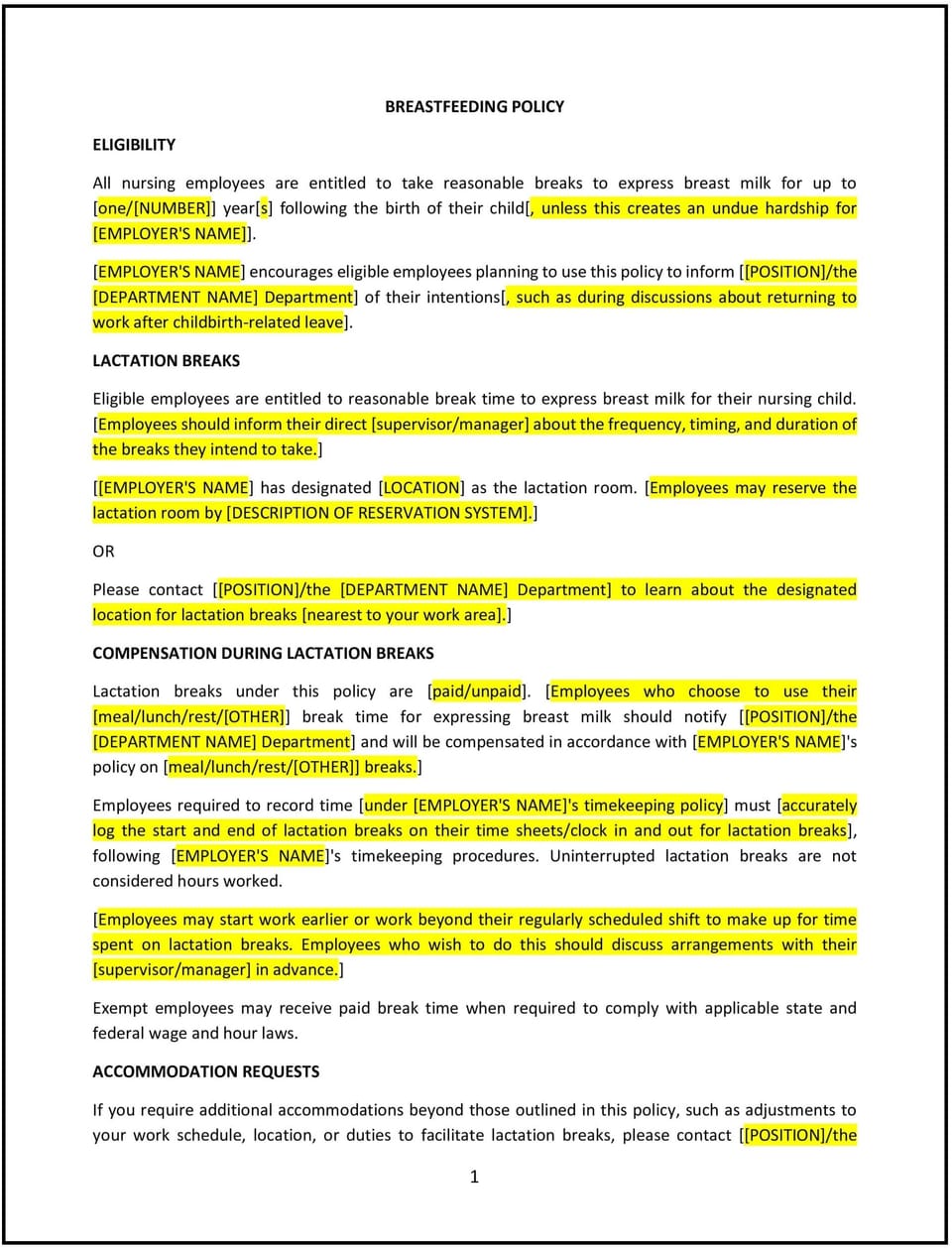Breastfeeding break policy (Delaware): Free template

Breastfeeding break policy (Delaware)
A breastfeeding break policy helps Delaware businesses support nursing employees by providing reasonable break times and private spaces for expressing breast milk during work hours. This policy aligns with federal and Delaware laws to ensure that employees can balance their work responsibilities with their breastfeeding needs.
By implementing this policy, businesses can promote employee well-being, support working parents, and create a family-friendly workplace.
How to use this breastfeeding break policy (Delaware)
- Define eligibility: Specify which employees are covered under the policy and the duration of eligibility after childbirth.
- Provide break times: Outline the frequency and duration of breastfeeding breaks, ensuring they are reasonable and flexible to meet individual needs.
- Designate private spaces: Ensure that employees have access to a clean, private, and non-bathroom space for expressing breast milk.
- Communicate expectations: Explain how employees can schedule breaks and coordinate with their supervisors to minimize disruptions.
- Ensure compliance: Follow all applicable Delaware and federal laws, including the Fair Labor Standards Act (FLSA), regarding breastfeeding accommodations.
- Maintain confidentiality: Protect the privacy of employees using the policy by keeping all related matters confidential.
Benefits of using this breastfeeding break policy (Delaware)
This policy offers several benefits for Delaware businesses:
- Supports employee health: Helps nursing employees maintain their health and that of their child by providing adequate time for breastfeeding or pumping.
- Promotes work-life balance: Demonstrates the company’s commitment to supporting employees as they balance work and family responsibilities.
- Enhances employee retention: Creates a family-friendly workplace culture that encourages employees to return to work after childbirth.
- Reduces legal risks: Ensures compliance with federal and Delaware laws, minimizing the risk of legal claims related to breastfeeding accommodations.
- Improves workplace morale: Fosters a supportive environment that values employee needs and promotes inclusivity.
Tips for using this breastfeeding break policy (Delaware)
- Communicate the policy clearly: Ensure all employees are aware of the policy, including their rights and how to request breastfeeding accommodations.
- Provide adequate facilities: Design private spaces that are comfortable, clean, and accessible to employees who need them.
- Be flexible: Allow employees to take breaks as needed and coordinate with supervisors to ensure minimal disruption to work.
- Train supervisors: Educate managers and supervisors on the policy to ensure consistent application and understanding of legal requirements.
- Review regularly: Update the policy periodically to reflect changes in Delaware or federal laws and evolving workplace needs.
Q: Why is a breastfeeding break policy important for my business?
A: This policy supports nursing employees, promotes work-life balance, and ensures compliance with Delaware and federal laws, fostering a family-friendly and inclusive workplace.
Q: What facilities should be provided for breastfeeding employees?
A: Employers must provide a clean, private, and non-bathroom space for expressing breast milk. The space should be comfortable and free from interruptions.
Q: Are breastfeeding breaks required to be paid?
A: Under federal law, breaks for expressing breast milk are generally unpaid unless they coincide with paid break times. Delaware businesses should ensure compliance with applicable regulations.
Q: How can employees request breastfeeding accommodations?
A: Employees should notify their supervisor or HR department of their needs and follow the outlined procedure in the policy to arrange for breaks and access to facilities.
Q: How often should this policy be reviewed?
A: The policy should be reviewed annually or whenever Delaware or federal laws change to ensure continued compliance and effectiveness.
This article contains general legal information and does not contain legal advice. Cobrief is not a law firm or a substitute for an attorney or law firm. The law is complex and changes often. For legal advice, please ask a lawyer.


